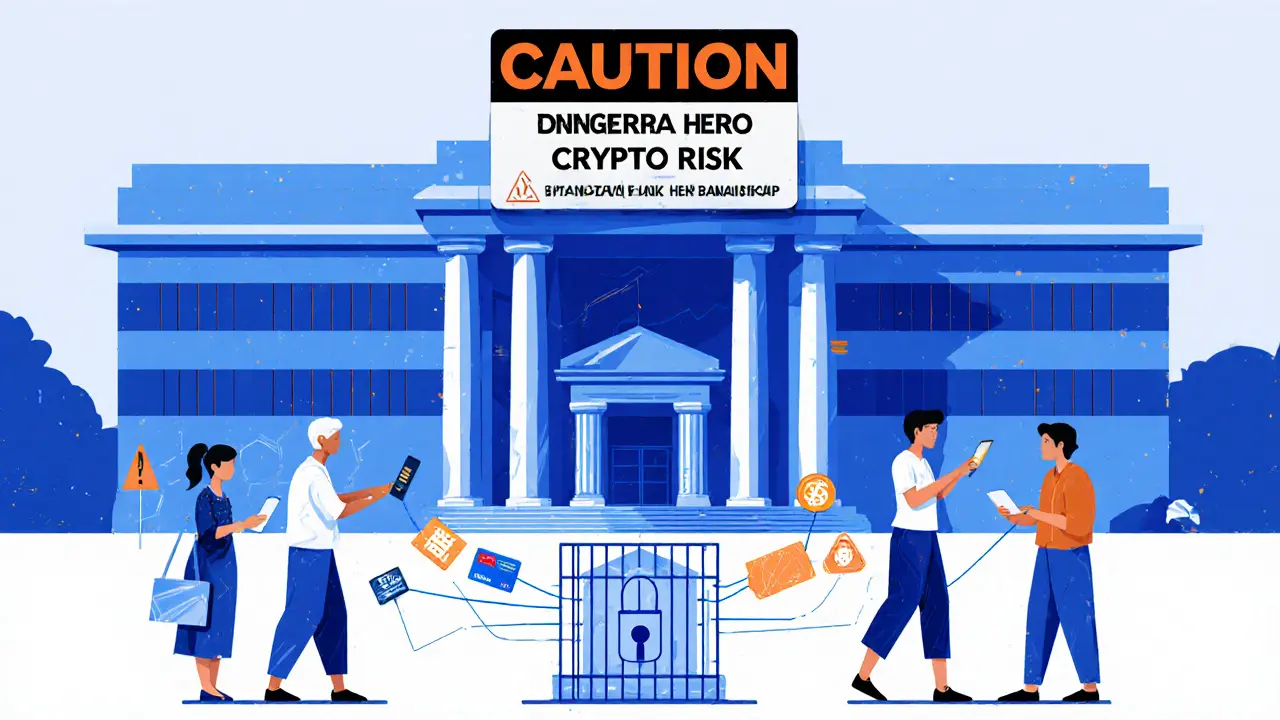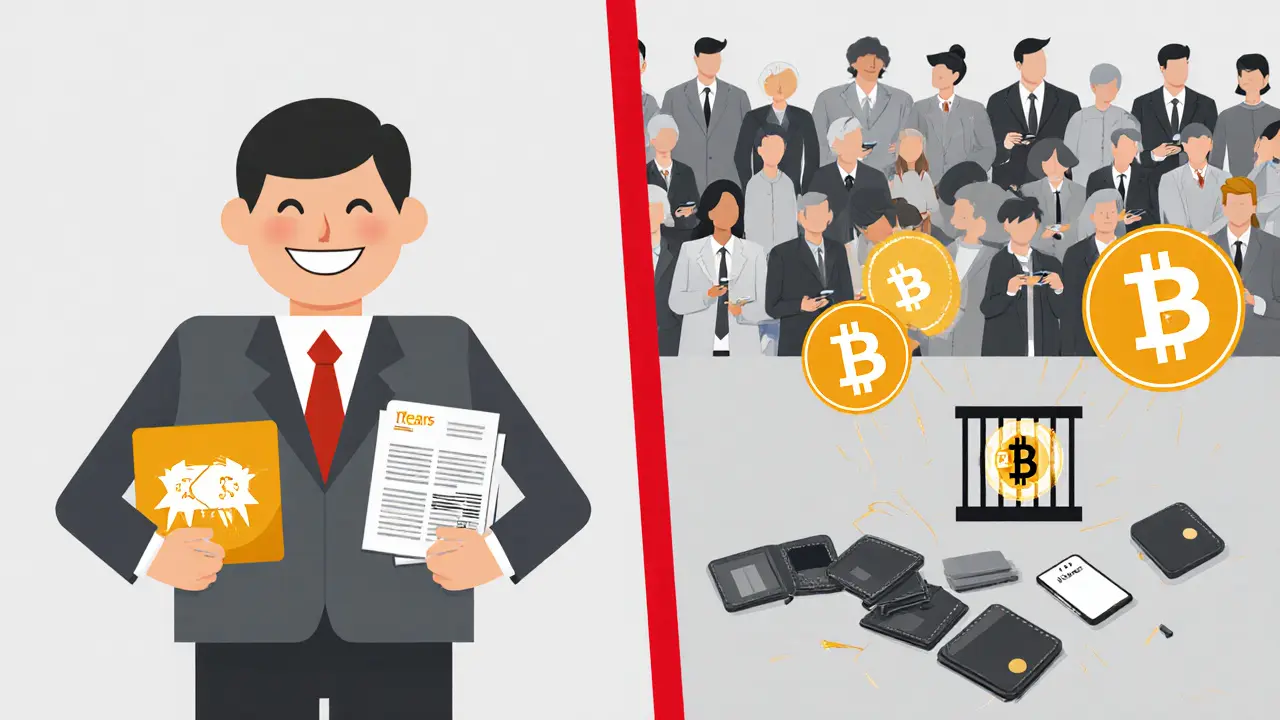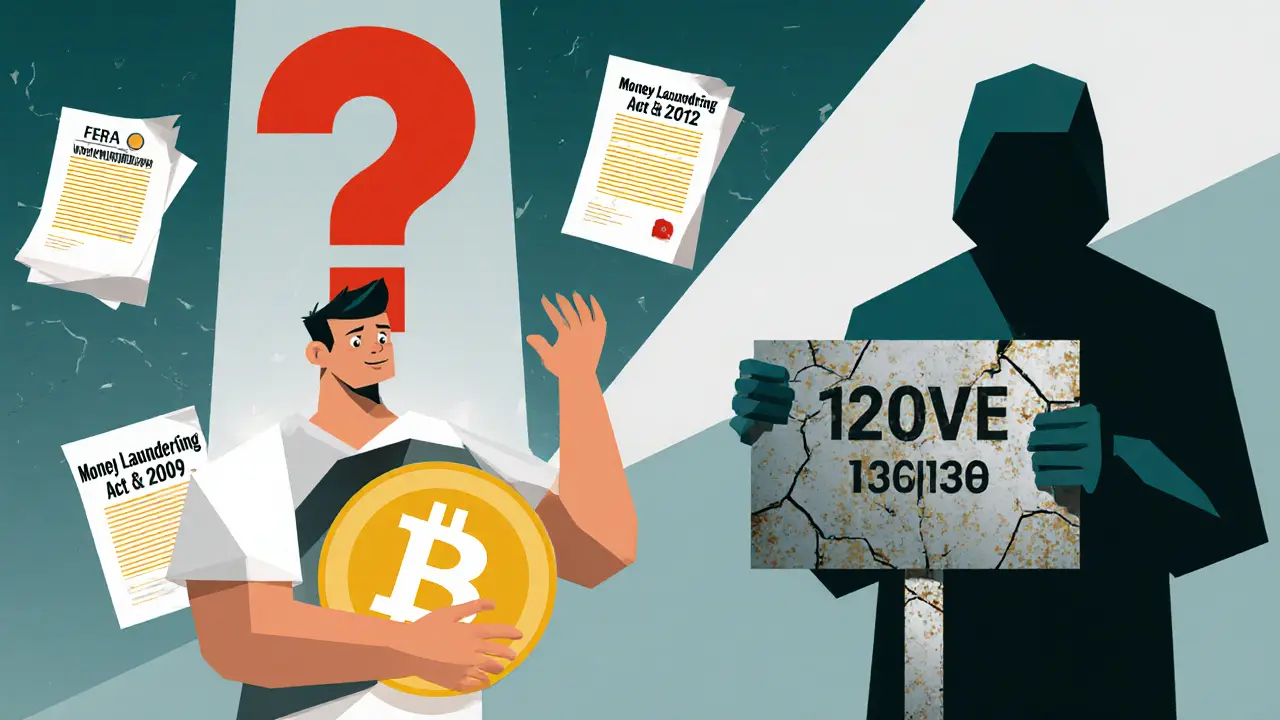Crypto Legal Risk Calculator
Assess Your Crypto Activity Risk in Bangladesh
This tool calculates potential legal risks for cryptocurrency activities in Bangladesh based on the current legal framework. Remember: It's not the crypto that's illegal—it's how you use it.
Your Risk Assessment
What This Means
Key Laws That May Apply
When you hear that trading cryptocurrency in Bangladesh can land you in jail for 12 years, it sounds like a hard-line ban. But the truth is more complicated - and far more confusing. There’s no law that says, "Trading Bitcoin is illegal and punishable by 12 years." Instead, what you’re hearing is a warning from Bangladesh Bank, repeated over and over, that crypto transactions could trigger penalties under existing financial crime laws. The 12-year figure? It’s not in any statute. It’s an extrapolation - and it’s been misquoted so often that most people believe it’s law.
Where Does the 12-Year Sentence Come From?
The number 12 comes from a mix-up between Bangladesh Bank’s public statements and the actual text of the country’s laws. In 2014, Bangladesh Bank issued its first warning about Bitcoin, saying any transaction involving cryptocurrency was a punishable offense. Officials told reporters that violators could face up to 12 years in prison. But when you look at the laws they cited - the Money Laundering Prevention Act 2012 - the maximum penalty is 10 years, not 12. The Anti-Terrorism Act 2009, added to the warning in 2017, doesn’t even mention cryptocurrency. The Digital Security Act 2018 caps penalties at 7 years for repeat offenses involving unauthorized electronic transactions.
So where did 12 come from? Legal experts believe it was a guess - or a scare tactic - by central bank officials trying to deter public interest in crypto. It stuck. International media picked it up, headlines screamed, and the myth became fact. Even today, you’ll find articles, forums, and YouTube videos repeating the 12-year claim as if it’s written in stone. But the law doesn’t back it up.
What Laws Actually Apply?
Bangladesh Bank doesn’t need a new law to crack down on crypto. It uses three old ones:
- Foreign Exchange Regulation Act (FERA) 1947 - This law controls all foreign currency transactions. It says you can’t send money abroad unless you go through an authorized bank. Buying crypto on Binance or Paxful with Bangladeshi taka? That’s technically an illegal foreign exchange transaction under FERA. Violations carry up to 5 years in prison for repeat offenses.
- Money Laundering Prevention Act 2012 - This targets the movement of illegally obtained money. If crypto is used to hide funds from tax authorities or fund criminal activity, then yes - you’re breaking this law. The maximum penalty here is 10 years. But owning crypto? Not illegal. Using it to launder money? That’s the crime.
- Anti-Terrorism Act 2009 - Added to the warning in 2017, this law is meant for financing terrorism. Bangladesh Bank claims crypto could be used this way. But there’s no public evidence of any crypto case being prosecuted under this law. It’s a legal nuclear option - rarely used, and never for individual traders.
Here’s the key point: It’s not the crypto that’s illegal. It’s how you use it. If you use taka to buy Bitcoin and then send it overseas to pay for drugs, that’s a crime - because you broke FERA and the Money Laundering Act. If you buy Bitcoin to hold it as an investment, without moving money out of the country illegally? The law doesn’t say you’re breaking the rules. But the bank still warns against it - and that’s where the gray zone begins.
There’s No Clear Ban - Just a Warning
Bangladesh Bank’s notices are labeled "Cautionary Notices." That’s not the same as a ban. A ban would be a law passed by Parliament. A caution is a warning - like telling people not to swim in a flooded river because it’s dangerous. The river isn’t legally off-limits, but if you drown, you’re on your own.
Legal analysts from Mahbub & Company have said it plainly: "The regulator has fallen short of banning or criminalizing the use of Bitcoin except in cases where it is used to commit an existing offense." Think of it this way: Using cash to bribe a police officer is illegal. But owning cash? Not illegal. The same logic applies here.
And yet, banks are ordered to block crypto-related transactions. ATMs won’t let you withdraw taka for Binance deposits. Mobile banking apps flag transfers to crypto exchanges. If you try to send money to a foreign crypto platform, your transaction gets rejected. That’s enforcement - not legislation.

Who Gets Punished? And How Often?
Here’s the most surprising part: No one has been sentenced to 12 years for crypto trading. Not one case. Not even close.
According to Bangladesh’s Anti-Money Laundering Department’s 2022 report, only 37 cases nationwide were filed under digital financial crime statutes. None involved crypto trading as the primary charge. In 2024, the Cyber Security Division recorded 17 crypto-related cases. Most involved fraud, hacking, or large-scale money laundering operations - not ordinary people buying Bitcoin on Binance.
Enforcement is selective. If you’re a small-time trader using your phone to swap taka for USDT, you’re unlikely to be targeted. But if you’re running a P2P exchange out of your home, collecting thousands of dollars from dozens of people, and moving money offshore? That’s when the authorities show up.
Chainalysis reported that between July 2021 and June 2022, crypto transaction volume in Bangladesh jumped 206%. That’s more than 2 million people using crypto - despite the warnings. P2P trading on platforms like Binance and LocalBitcoins grew by 347% after the 2021 crackdown. People aren’t stopping. They’re just getting smarter.
The Blockchain Paradox
Bangladesh’s government doesn’t hate technology. In 2020, it launched a National Blockchain Strategy - a plan to use blockchain for land records, voting, and public services. The government wants the tech - just not the currency.
This contradiction is intentional. Blockchain is seen as a tool for efficiency and transparency. Cryptocurrency? It’s seen as a threat to financial control. The central bank fears losing power over money flows. If people can send value across borders without banks, the state loses its grip on taxation, surveillance, and capital controls.
That’s why the message is so confusing: "We don’t ban blockchain. We just ban crypto." But in practice, it’s hard to separate the two. Many crypto wallets use blockchain. Many blockchain projects use tokens. The line is blurry - and the government is choosing to blur it further.

What Happens If You Get Caught?
If you’re caught trading crypto, here’s what you’re likely to face:
- Your bank account gets frozen - no appeal, no warning.
- Your phone number or ID gets flagged in the central bank’s system.
- If you’re a large operator, you might be questioned by police or the Cyber Crime Unit.
- If you’re accused of laundering money or violating FERA, you could face charges - and up to 5 years in prison.
- But you won’t get 12 years. Not unless you’re tied to terrorism or massive fraud - and even then, it’s rare.
Most cases end in fines, not jail. In 2023, the Bangladesh Securities and Exchange Commission admitted that inconsistent enforcement is a major problem. They don’t have the resources, or the legal clarity, to go after millions of small traders.
How People Are Bypassing the Rules
People aren’t waiting for the law to change. They’re working around it:
- P2P trading - Using apps like Binance P2P, traders find individuals willing to accept taka in cash or mobile banking. No bank involvement = no trace.
- Foreign SIM cards - Some use international phone numbers to sign up for crypto exchanges that block Bangladesh IPs.
- Gift cards and prepaid cards - Buying USDT with gift cards from Amazon or Steam is a popular workaround.
- Offshore accounts - People with family abroad use those accounts to receive crypto, then convert it locally.
These methods aren’t legal. But they’re common. And as long as enforcement stays inconsistent, they’ll keep working.
The Bigger Picture: Why This Matters
Bangladesh isn’t alone. China banned crypto. India taxed it. Vietnam cracked down. But Bangladesh’s approach is unique - it’s a warning without a law, a threat without a track record. The result? A population caught between fear and opportunity.
For young professionals, crypto is a way to save money, hedge against inflation, and access global markets. For the government, it’s a loss of control. The central bank wants to protect the taka. But the taka is losing value. People are looking for alternatives.
Until Parliament passes a clear law - either banning crypto outright or regulating it - the 12-year myth will live on. And so will the trading.

Becky Shea Cafouros
November 14, 2025 AT 07:34So let me get this straight - the government doesn’t ban crypto, but if you use it, your bank freezes your account anyway? That’s not a warning. That’s a threat with no legal backing. And people wonder why trust in institutions is dead.
sandeep honey
November 15, 2025 AT 13:52India’s been doing this for years - tax crypto, don’t ban it. Bangladesh is just late to the game. The real issue isn’t crypto - it’s control. If people can move money without banks, the elite lose power. Simple as that.
Hannah Kleyn
November 16, 2025 AT 18:48I live in the US but my cousin in Dhaka trades USDT via P2P every week. He uses cash from his uncle’s shop, no bank touch. He says the cops only come if you’re moving thousands. Small fry? They ignore you. It’s like driving 5 over the limit - technically illegal, but no one cares unless you get reckless.
Robert Astel
November 18, 2025 AT 08:34Think about it - blockchain is like fire. You can use it to warm your home or burn down a city. The government wants the warmth without the risk. But you can’t separate the tech from the currency. It’s like saying you can own a car but not gas. The system is built on contradictions. They fear decentralization because it makes them irrelevant. And yet they’re building a national blockchain strategy? That’s not hypocrisy - that’s cognitive dissonance on a national scale. They want control but also progress. Impossible. And people are just trying to survive inflation with a tool they understand. The real crime is the lack of transparency. Not the crypto.
Kandice Dondona
November 18, 2025 AT 10:49So many people think crypto = crime but it’s really just people trying to outsmart broken systems 💪🌍 I’m so proud of those in Bangladesh keeping it going - you’re not breaking the law, you’re just outsmarting outdated rules. Keep going!! 🙌
anthony silva
November 19, 2025 AT 03:4412 years for trading Bitcoin? Wow. Next they’ll jail you for using a VPN to watch Netflix. At this point I’m just waiting for the government to start charging people for thinking too hard.
Mandy Hunt
November 21, 2025 AT 03:03They’re lying about the 12 years because they know people will panic and stop. But the real plan? They’re building their own digital currency. They want you to use THEIR blockchain. Not yours. They’re scared of decentralized money because it can’t be tracked. This is all about surveillance. You think this is about crime? No. It’s about control. And they’ll use fear to get it.
Andrew Parker
November 22, 2025 AT 22:51Imagine being told you can’t use a tool because someone might misuse it… then being told you’re free to use every other tool that’s just as dangerous. That’s not policy. That’s emotional blackmail wrapped in a legal suit. And now people are risking jail just to save their money from inflation? The real villain here isn’t Bitcoin. It’s the people who profit from keeping the system broken.
David Cameron
November 23, 2025 AT 04:25There’s a difference between law and power. The state doesn’t need a law to punish you if it can control your bank account. That’s not justice. That’s coercion dressed as regulation. And the fact that people still trade? That’s not rebellion. That’s human instinct. We’ve always found ways to move value when the system fails us. This isn’t crypto. This is survival.
ratheesh chandran
November 23, 2025 AT 06:57People in India are doing the same thing with USDT and UPI. Bangladesh just got slower at catching up. The real story here is how fast people adapt. They don’t wait for permission. They just find a way. That’s why no one gets jailed for small trades - because the system can’t handle it. They’re not smart enough to police millions. And that’s their weakness.
Vanshika Bahiya
November 23, 2025 AT 10:45For anyone in Bangladesh reading this - if you’re trading crypto, you’re not doing anything wrong. You’re just using a tool that works better than the broken system. Don’t let fear stop you. Use P2P. Use gift cards. Use cash. Just be smart. And if you’re helping others learn, you’re not a criminal - you’re a community builder. We need more of you.
Kevin Hayes
November 24, 2025 AT 12:41The legal ambiguity here is the point. It’s not an accident. It’s a feature. By keeping the law vague, the state maintains maximum control. You don’t need to pass a law to intimidate people. Just threaten them with an unverified number - 12 years - and let fear do the work. It’s psychological governance. And it’s working. But only until people realize the number is fiction.
Kelly McSwiggan
November 24, 2025 AT 15:10Let’s be real - this isn’t about crypto. It’s about the central bank’s existential crisis. Their entire model is built on intermediation. Crypto removes intermediaries. So they respond with theater. 12-year prison sentences? That’s not law. That’s performance art for a dying financial regime. The only thing getting punished here is common sense.
Cody Leach
November 25, 2025 AT 10:24I’ve been following this for years. The data doesn’t lie - 2 million people are using crypto in Bangladesh. No one’s getting 12 years. No one’s even getting jail time. The system is too big to shut down. The crackdown is symbolic. The real story is that the people won. They found a way. And the authorities are just pretending they can stop it.
Katherine Wagner
November 25, 2025 AT 12:13So… crypto isn’t illegal… but banks block it… and if you’re caught you might get charged under FERA… which has a 5-year max… but everyone says 12 years… so what’s the point of any of this? Just to confuse people? Because it’s working. I’ve seen people quit crypto just because they heard 12 years. That’s the real victory for the bank. Not law. Manipulation.
Albert Melkonian
November 26, 2025 AT 06:39It is profoundly instructive to observe that the absence of a codified statute does not equate to the absence of regulatory pressure. The state, through administrative fiat and institutional intimidation, has created a de facto prohibition without the democratic legitimacy of legislative enactment. This phenomenon, observed across multiple jurisdictions, reflects a broader global trend wherein technocratic institutions prioritize control over clarity - a trend that ultimately erodes public trust and incentivizes underground innovation. One must ask: Is the preservation of monetary sovereignty worth the erosion of civil autonomy?
Drew Monrad
November 27, 2025 AT 04:4512 YEARS?!?!?!? That’s not a warning - that’s a death threat disguised as a policy. I’m not even mad. I’m just… devastated. People are risking their freedom just to buy Bitcoin? This isn’t a country. It’s a dystopian fanfic written by a central banker with a god complex. I’m crying. I’m literally crying. Who let this happen? Why isn’t the world screaming?!
gary buena
November 28, 2025 AT 09:48My uncle in Dhaka told me he’s been buying USDT for 3 years. He uses a guy at the market who takes cash and sends the crypto. No one’s ever bothered him. He says the cops only care if you’re rich or loud. Small traders? They’re invisible. The system’s too broken to catch everyone. That’s why it’s still growing. Not because it’s legal. But because it’s practical.